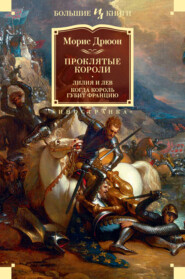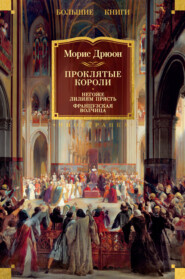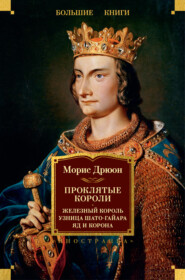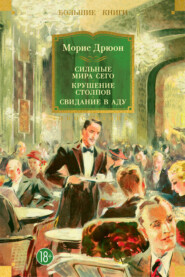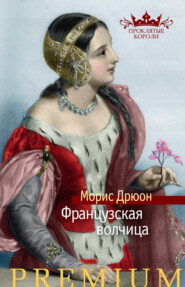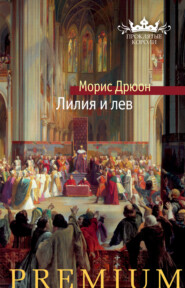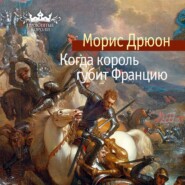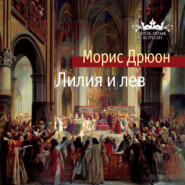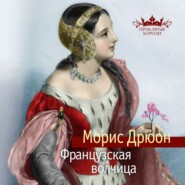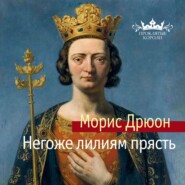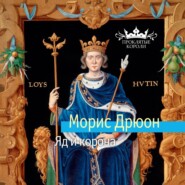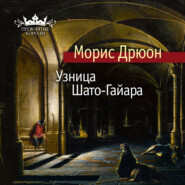По всем вопросам обращайтесь на: info@litportal.ru
(©) 2003-2025.
✖
The Accursed Kings Series Books 1-3: The Iron King, The Strangled Queen, The Poisoned Crown
Автор
Год написания книги
2018
Настройки чтения
Размер шрифта
Высота строк
Поля
‘Isn’t it bad enough to have lost a husband without having to pay six hundred pounds to keep a roof over one’s head? I shall complain to the Count of Dreux,’ repeated Dame Eliabel.
‘We have already paid three hundred,’ said the bearded son.
‘To seize our possessions is to reduce us to hunger, to sell them is to condemn us to death,’ said the second son.
‘The law is the law,’ replied the Provost. ‘I know the law and I shall sell you up as surely as I am levying distraint.’
Once more these were the very words that Guccio had prepared.
‘This Provost seems an odious man. What grudge does he owe you?’ Guccio asked in a low voice.
‘I don’t know, and my brothers know little more: we understand very little about these things,’ replied Marie de Cressay. ‘It is something to do with inheritance tax.’
‘And is that what the six hundred pounds are due for?’ said Guccio.
‘Disaster has overtaken us,’ she murmured.
Their eyes met, held for a moment, and Guccio thought the girl was going to burst into tears. But on the contrary, she was brave in the face of adversity, and it was only from modesty that she turned her beautiful dark blue eyes away.
Guccio thought for a moment. His anger against the Provost was beginning to mount, precisely because the man was showing him the disagreeable part that he had been prepared to play himself.
Suddenly, leaping across the room, Guccio flung himself before the agent of authority and cried, ‘Wait a moment, Messire Provost! Are you quite sure that you are not in process of committing theft?’ In his stupefaction, the Provost turned upon him and asked him who he was.
‘That does not matter,’ replied Guccio, ‘and you’ll be much happier in ignorance, if by any chance your accounts are not correct. I, too, have reason to be interested in the inheritance of the Squires of Cressay. Would you be so good as to tell me your estimate of the value of the estate?’
As the other tried to take a high tone with him, threatening him with the sergeants-at-arms, Guccio went on, ‘Take care! You are speaking to a man who but the other day was the guest of the Queen of England, and who tomorrow has the power to make known to Messire Enguerrand de Marigny how his Provosts behave. So you’d better answer, Messire: how much is the estate worth?’
These words had considerable effect. At the name of Marigny, the Provost was troubled; the family fell silent, listening astonished; and Guccio felt that he had grown in stature by a couple of inches.
‘According to the estimates of the bailiwick, Cressay is worth three thousand pounds,’ the Provost at length replied.
‘Really, three thousand?’ cried Guccio. ‘Three thousand pounds a country manor, while the Hôtel-de-Nesle, one of the most beautiful houses in Paris, the residence of Monseigneur the King of Navarre, is scheduled on the registers of the tithe at five thousand pounds? Estimates in your bailiwick are very high.’
‘There is the land too.’
‘The whole estate is worth no more than fifteen hundred and I know this from a sure source.’
Upon part of his forehead, above his left eye, the Provost had a birthmark, a huge strawberry-mark which turned violet in emotion. While talking to him Guccio never took his eyes off it, and this put the Provost somewhat out of countenance.
‘Would you mind telling me now,’ went on Guccio, ‘what the inheritance tax is?’
‘Fourpence in the pound in this bailiwick.’
‘You’re lying disgracefully, Messire Portefruit. The tax is two-pence in the pound for nobles in every bailiwick. You are not the only one who knows the law. I know it too. This man is taking advantage of your ignorance to cheat you like the thief he is,’ said Guccio, turning to the Cressay family. ‘He comes here to cheat you by using the King’s name, but he has failed to tell you that he farms tithes and taxes, and that he will send to the King’s Treasury only what is prescribed by law while the rest goes into his own pocket. And if he sells you up, who will then buy the Castle of Cressay, not for three thousand but for fifteen hundred or less, or merely for the debt? This is a fine plan, Messire Provost!’
All Guccio’s irritation, all his anger and annoyance, accumulated upon the journey, had now found its outlet. He grew heated as he talked. He had found at last an opportunity of seeming important, of being respected and of playing the part of a strong man. Without being altogether aware of it, he had gone over to the camp he had come to attack, he was defending the weak and assuming the role of a righter of wrongs.
As for the Provost, his fat round face had grown pale and the violet strawberry-mark above his eye made a dark patch upon his forehead. He waved his over-short arms up and down like a duck. He protested his honesty. It was not he who had calculated the accounts. A mistake might have been made by his clerks or perhaps by those of the bailiwick.
Very well! We will calculate these accounts over again,’ said Guccio.
In a few minutes he was able to show that the Cressays owed no more than a hundred and fifty pounds.
‘So you had better order your sergeants to release the oxen, take the corn back to the mill and leave honest people in peace!’
Taking the Provost by the sleeve, he led him to the door. The Provost did as he was bidden and called to his sergeants that a mistake had been made, that the whole matter must be checked, that they would return upon some future occasion, but that for the moment all must be restored to its accustomed place. He thought that he had finished with the affair, but Guccio led him back to the centre of the hall saying, ‘Now return us a hundred and fifty pounds.’
Guccio had taken the part of the Cressays to such an extent that he was beginning to say ‘us’ in defending their cause.
At this point the Provost was wild with anger, but Guccio quickly deflated him.
‘Didn’t I hear you say a moment ago,’ he asked, ‘that you had already collected three hundred pounds in the past?’
The two brothers agreed that this was so.
‘Well, Messire Provost, a hundred and fifty pounds,’ said Guccio holding out his hand.
The fat Portefruit tried to argue. What had been paid had been paid. The accounts of the Provostship must be looked into. Besides, he hadn’t so much gold on him. He would come back.
‘It would be better for you if you could find the gold about you. Are you sure that you have received no other sums today? Messire de Marigny’s agents work very quickly,’ said Guccio, ‘and it would be healthier for you to have done with this business on the spot.’
The Provost hesitated for a moment. Should he call his sergeants? But the young man looked so peculiarly active and carried such a good small-sword at his side. Besides, the two brothers Cressay were there, and they were solid fellows who had hunting-spears at hand upon a chest. The peasants would undoubtedly take their masters’ part. It seemed a bad business in which he should try to avoid complications, particularly since Marigny’s name was suspended over his head. He surrendered: taking a heavy purse from beneath his coat, he counted out the amount of the overcharge upon the lid of a chest. Then only did Guccio let him go.
‘We shall remember your name, Messire Portefruit,’ he shouted to him from the door.
He returned, a broad smile upon his face, revealing fine teeth, white and regular.
The family immediately surrounded him, plying him with thanks, treating him as their saviour. In the general excitement the beautiful Marie de Cressay seized Guccio’s hand and raised it to her lips; then seemed suddenly afraid of what she had dared to do.
Guccio, very pleased with himself, found that his new role suited him admirably. He had conducted himself in precise accordance with his ideals of chivalry; he was a knight-errant who had arrived at an unknown castle to rescue a young lady in distress, to protect a widow and orphans from the machinations of wicked men.
‘But who are you, Messire, to whom do we owe all this?’ asked Jean de Cressay, the son with the beard.
‘My name is Guccio Baglioni; I am the nephew of the banker Tolomei and I have come to collect our debt.’
There was an immediate silence in the room, the faces of the family glazed over. They looked at each other in fear and consternation. And Guccio felt that he had lost his advantage.
Dame Eliabel was the first to recover herself. She quickly swept up the gold the Provost had left and, with a fixed smile, said in a rather sprightly way that they would discuss all that later, but for the present she insisted that their benefactor should do them the honour of dining with them.
She at once began busying herself, sent her children on a variety of errands and, gathering them together in the kitchen, said to them, ‘Take care, whatever he may have done, he remains a Lombard. One should always distrust those people, particularly when they have done one a good turn. It is very unfortunate that your poor father should have had to have recourse to them. Let us show this one, who indeed has a sympathetic air, that we have no money, but let us do it in such a way that he is unable to forget that we are nobles.’
For Madame de Cressay was much concerned with nobility, as small provincial gentlemen have always been, and she thought it a great honour for one who was not noble to have the privilege of sitting at her table.
Luckily, the two sons had brought back a sufficiency of game from hunting the day before; several chickens had their necks wrung; and so it was possible to have the two courses of four dishes each which were essential to the keeping-up of seignioral appearances. The first course consisted of a clear German soup with fried eggs in it, a goose, a stewed rabbit and a roasted hare; the second, of a rump of wild boar served with a sauce, a fat capon, bacon stewed in milk, and blancmange.
Only a small menu, but one, nevertheless, that exceeded the usual porridge and fried lentils with which, like peasants, the family had generally to be content.
All this had to be prepared. The wine was brought up from the cellar; the table was laid on trestles in the Great Hall before one of the benches. A white tablecloth reached to the floor and the diners raised it to their knees in order to wipe their hands upon it. There were pewter bowls for two, but a single one for Dame Eliabel, which was consonant to her rank. The platters were placed in the middle of the table and everyone helped themselves with their fingers.






